Montpellier finished 15th season last year, after having won the Ligue 1 title in 2011-12Winning a 38/40 game league is not something every other team can do – it takes consistency over the duration of the season. This consistency is often built as a result of years of strategic and technical training, and often takes years to hone. Usually once done, these champion teams are all almost always there or there abouts, competing for the title – which is why you have the Real Madrids, the Barcelonas, the Juventuses and the Bayern Munichs of this world competing for, and winning, domestic titles year after year.Sometimes though, fairytales become reality. The right money comes in, the right manager gets associated with the right players – and magic happens. Unheralded teams put up displays that stun the established lot and romp home with the goods. Oftentimes though, they fail to sustain this success with financial troubles, bigger clubs with bigger wallets, and internal mis-management all playing its due course in pulling the unfancied challengers crashing down to earth,Here, we take a look back at 6 sides who spent an amazing season(s) at the very top of their leagues but since have disappeared – either into mid-table mediocrity or relegated obscurity.
#1 Sampdoria (1990 91)
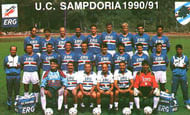
In the late 80’s the Italian Serie A had emerged as undisputedly the place to be if you wanted to consider yourself a top, top football player. The three foreigner rule in vogue at the time saw the crème de la crème of world football vying to find themselves a spot in the powerhouses of Milan, Naples and Turin, and their dominance on the league was all-encompassing.
The Dutch holy trinity of Van Basten, Gullit and Rijkaard at Milan, the competing German triumvirate of Matthaus, Brehme and Klinsmann at Inter and the South American superstars Maradona, Careca and Caniggia at Napoli were the hubs around which those champion sides had been built.
In the (relatively) small port town of Genoa, however, there was an unheralded team on the rise with an all-Italian flavour about them (all though coached by a Serbian in the form of the remarkable Vujadin Boskov). Considering their opposition, the mere fact that little Sampdoria had risen to become credible challengers would have been remarkable by itself, but what they did over the course of the season cemented their places in footballing folklore.
With Gianluca Pagliuca stationed behind an impenetrable fortress of a defence marshaled by the indomitable and insanely tough Pietro Vierchwood, the club had embraced that most pure of Italian philosophies – catennaccio. But this wasn’t catenaccio as the immortal Helenio Herrera had perfected it. For it turned out that Samp were also the most fun team in the land.
The rocket-fuelled winger Atillio Lombardo ripped teams apart and softened them up for the main act to come along and finish them off. Gianluca Vialli and Roberto Mancini - Samp’s terrible twins, one a ruthless powerful force of nature and the other a twinkle-toed devil of a genius, destroyed all that stood in their way in performance after performance of counter-attacking brilliance.
This was no smash and grab against weakened opposition, they beat all the big sides on the way to a comprehensive championship triumph – their first (and till now only) Scudetto. Vialli left the next season, along with Boskov and soon they were on a disastrous slide that got them relegated in 1999. They are back in Serie A now – a decent mid-table unit, as demonstrated by their 12th place finish last season.
#2 Leeds United (1991-92)
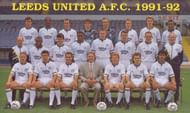
Nearing the fag end of the 1991-92 season, a certain Alex Ferguson seemed to have sealed his place in Manchester United folklore as the Mancunians looked set to win a first league win in 25 years. As it turned out, they would have to wait for one more year and the dawn of an era (and what an era it would turn out to be), as their Yorkshire neighbours had other plans that season.
With a defence that more often than not lived true to the maxim “the whole is greater than the sum its parts” and the textbook big man-little man strike partnership of Lee Chapman and Rod Wallace sandwiching one of the best midfields England had seen until then in the forms of Gordon Strachan, Gary McAllister, David Batty and a young, quick-footed Gary Speed, Leeds United were a formidable unit.
They had it all - speed and grit, brain and brawn, youth and experience and most of all, class throughout. Add a certain volatile Frenchman to the mix in the majestic form of Eric Cantona, and you had a mighty fine mix.
Cantona, though, didn’t have as much a role to play in Leeds’s triumph as many think - they were driven more by the drive and tenacity of Strachan and his midfield cohorts. In a rollercoaster season that saw the lead change hands between Leeds and United several times, the Whites held their nerves as they secured 13 points from the final five games to United’s four. This proved critical as they won the 1991 League title by just four points!
The triumph marked the end of an era as the English domestic league would get transformed with the emergence of the arrival of the newly nomenclatured “Premier” league and the steamrolling domination of Alex Ferguson and his United outfits. This would also be the last league title won by a side managed by an Englishman – the incomparable Howard Wilkinson - who took his tightly drilled yet paradoxically entertaining side to uncharted heights in that one glorious season.
His successor, George Graham took Leeds on a near re-enactment of this fairytale, as they consistently were there or thereabouts for the title from 1997-2001, but a tragic financial implosion was soon followed by relegation. The proud team still hasn’t recovered from the excesses of that era and last season finished 15th in the Championship (England’s second tier)
#3 Blackburn Rovers (1994-95)
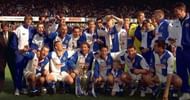
Kenny Dalglish had seen it all before – the cornucopia, the glitz, the glamour and the crown only worn by the champions of England – but Blackburn Rover’s had last seen it more than two generations ago. 81 years to be precise.
The Scottish legend who had created wonders in his playing (and coaching) days at Liverpool, managed a team that had only recently been promoted after acquisition by Jack Walker and the infusion of money from his considerable coffers.
Now, to say that Rovers “bought their way to the title” is as ignorant, as it is insulting of the team that Dalglish had managed to put together. Combining big money signings with astute and canny additions to the squad, the Scot marshalled the extremely talented likes of Graeme Le Saux, Tim Sherwood, Colin Hendry to form a tightly organized team that played through the wings where Jason Wilcox (a youth team graduate) and Stuart Ripley created havoc with their superb crosses that were inevitably aimed at one of the deadliest strike partnerships seen in English league history – the dreaded SAS.
England’s poster boy Alan Shearer and his unheralded compatriot Chris Sutton formed a formidable partnership that had pace, power, strength and an aerial presence that was truly terrifying. Their impact can be seen for itself in the goals for column – of Blackburn’s 80 league goals, they scored 49!
In the end they pipped Manchester United to the finish by one point – SAS’s goals separating them from their chasing herd. However, and without taking anything away from Blackburn, it probably helped that United’s talisman, Eric Cantona, went missing in action late in January after being slapped with an eight month ban for kung-fu kicking the face of a xenophobic Crystal Palace fan at Selhurst Park.
Blackburn have never been anywhere near those heights since, struggling at times merely to survive in the first-tier before being relegated in 2012 to the Championship (where they have remained since) after the disastrous takeover of the club by Indian conglomerate Venketeshwara Hatcheries – Venky’s.
Last season, they finished 8th in the Championship but still seem to struggling with ownership and management issues.
#4 Deportivo La Coruna (1999-00)

In 1988, the proud old club of Deportivo La Coruna was languishing deep down in the second tier of Spanish football – the Segunda Division. Arsenio Iglesias, a former player and manager, was bought back in a desperate attempt to salvage some pride. And salvage he did – winning promotion for the first time in 18 years and then going on to build a side that would end up challenging for the league title with their much bigger and much more fancied opposition and finishing runners up in ’94 and ’95.
The tiny town of A Coruna was ecstatic at the high-flying performances of their team and started calling their belove team, Super Depor. But the team would truly fit into the “Super” title after the Basque legend Javier Irureta. In the ’99-’00 season, he would lead his side on an improbable fairytale run to the league title.
In the team, the Cameroonian Jacques Songo’o prowled behind a defence marshalled by the indomitable Noureddine Naybet and a midfield filled with that perfect combination of grit and flair in the shapes of Mauro Silva, Djalminha and Fran. They joined forces to form a formidable defensive and creative unit that was spearheaded by the ruthless brilliance of Diego Tristan and Roy Makaay – two strikers who, when join4d together as a strike partnership flourished, but oftentimes had huge ego-clashes as they vied for a place in Irureta’s 4-5-1 formation.
During this golden period of Super Depor lasting from 1992-93 to 2003-04, they would end up second four times, third another four times and would even reach the semifinals of he Champions League in 2004. This is of course crowned by the brilliance of the 1999-00 season where Depor would beat off strong challenges from Barcelona and a powerful Valencia side (with how Depor have shared an undying enmity ever since that infamous draw that A Coruna fans say, with justification, stole their title away from them in ’94)
Their unusually long fairytale would end in 2011 when they were relegated once again, and even though they won back immediate promotion, they would go back again the next year. Last season they finished second in the Segunda Division and won promotion to the top tier.
As of today, they have won one and drawn one – we can consider ourselves lucky if we even get a shadow of the Super Depor of yesteryears
#5 Lazio (1999-00)
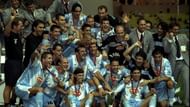
Nobody has celebrated a club centenary like Lazio. The Roman club had, until that 100th year won only one Scudetto (in’74) and a couple of Coppa Italias (one of which incidentally came the year before – i.e.in the 99th year). Managed by that ice-cold Swede Sven Goran Eriksen, the Lazio team of ’99-’00 was a brilliant side that boasted extreme quality in all part3s of the pitch.
With a young Alessandro Nesta putting in the kind of performances that would soon make him one of the best defenders to have played the game, and the enigmatic genius of Sinsia Mihjalovic and his deadly left foot shepherding the defence, the side really came into its own in the middle of the park where Diego ‘El Chulo’ Simeone patrolled the area with his trademark tigerish feverishness protecting the back four like only he could along with the Serbian midfield general Dejan Stankovic and his deadly sledgehammer of a right foot. While further forward the effervescent genius of Pavel Nedved and the majesty of Juan Sebastian Veron created magic of a like that has not been seen since at the club (all due respect to Marek Hamsik)
In front of this magical midfield was the attacking genius of Roberto Mancini and the deadliness of the Croat Alen Boksic and the Chilean superstar Marcelo Salas. Add the eccentric brilliance of Fabrizio Ravanelli to this and you have one of the most exciting teams seen on Italian soil.
That centenary year, 1999-00, they won their first ever double sweeping the Serie A and Copa Italia trophies in the most comprehensive manner and would secure the UEFA Cup Winners’ Cup for the first and only time in their history.
Le Aquile (The Eagles), would remain as part of the elite few in the following years – painfully though they would secede their title to hated rivals Roma as they finished the 2000 season third, despite the goals of new arrival Hernan Crespo. They haven’t ever had a run like they had at the beginning of the millennium since and have now become a side that vies for the mid-table spots, finishing 9th last season
#6 AZ Alkmaar (2008-09)
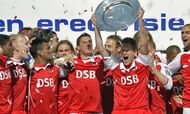
In the 2007-08 season, the manager of AZ Alkmaar, a small club in a tiny town from had decided to leave his job. Who could fault him? Having come to within a day of winning the Eredivisie the season before and the team had never really recovered from that loss on the final day. In the ’08 season, they had finished an abysmal eleventh and had even been flirting with relegation at one point.
Somehow, the desperate squad members convinced the man (who had started his illustrious career as assistant at AZ) to stay. No-one, not the experts, not the fans, not the other teams – gave Van Gaal and his demoralized AZ team a chance. As per script, they started poorly, getting thrashed in the first two games.
What followed that though was a lesson on why you should never write off anyone in sport – least of a champion manager like Van Gaal. Turning the classically possession obsessed Dutch school of football on its head, he turned AZ into a textbook counter attacking side.and would go an unbelievable 28 game unbeaten run that saw them romp home to their second Dutch title.
With quick, incisive passing backed by the ruthless finishing of Mounir El Hamdaoui that worked on the solid foundation of a tough as nails defence and a midfield marshalled by the tough-tackling quick passing Demy De Zeeuw, AZ played brilliantly all season. After 28 long years of the hegemony of the big three – Ajax, PSV and Feyenoord, an outsider club had finally won an Eridivisie title. Along with Van Gaal, credit went to the owner Dirk Scheringa, whose consistent investments had helped turn this regional club into a true national superpower.
The next season Van Gaal would leave the DSB Stadion to take his iron discipline and eccentricities to Bayern Munich, leaving Ronald Koeman in charge at AZ. That started a downward spiral that has not stopped yet, and the team from Alkmaar finished 8th in the league last time around